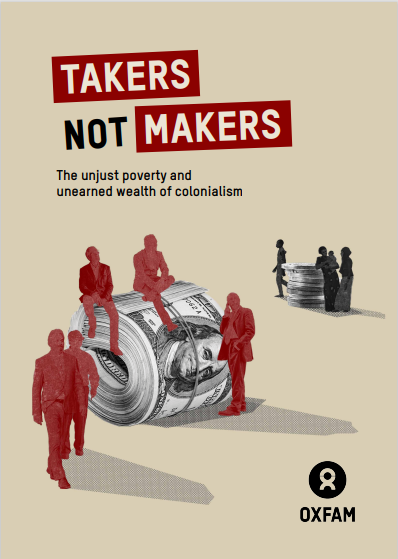January 20th marked the beginning of the 2025 World Economic Forum’s annual meeting in Davos. The event brings together global leaders in politics and business to discuss key global and regional challenges – such as responding to geopolitical shocks and stimulating economic growth – with little transparency or representation from regular citizens and other stakeholders.
As business elites gathered in this Swiss resort town and shady billionaire Donald Trump – backed by tech business barons – was inaugurated as President of the United States, Oxfam published their annual Davos report “Takers Not Makers – The unjust poverty and unearned wealth of colonialism”. The report challenges the pervasive idea that extreme wealth is a reward for extreme talent and brings the colonial practices and economic distortions that billionaires benefit from into the spotlight. It also underscores the need for just tax policies as advocated for by the Fair Tax Monitor, whereby the wealthiest are fairly taxed in order to reduce the massive disparity between the rich and poor.
On a global scale, billionaire wealth grew by $2 trillion in 2024 alone, equivalent to roughly $5.7 billion a day, at a rate three times faster than the year before. An average of nearly four new billionaires were minted every week.

Last year, the emergence of the first trillionaire within a decade was predicted. However, with billionaire wealth accelerating at a faster pace, this projection has expanded dramatically — at current rates, the world is now on track to see at least five trillionaires within that time frame.
This dramatic increase in wealth concentration is concerning, especially in a context of enduring and pervasive inequality. According to the World Bank, the number of people living in poverty has barely changed since 1990. Equitable tax systems could do so much to move the dial on this appalling statistic. “Takers Not Makers” furthermore illustrates how the extreme wealth of today’s billionaire class is largely unearned. It shines a light on two major sources of unearned wealth.
First, the report underscores the influence of inheritance, cronyism and monopoly power in the generation of extreme wealth. It is calculated that 36 percent of billionaire wealth is now inherited. Research by Forbes found that every billionaire under 30 has inherited their wealth,[1] while UBS estimates that over 1,000 of today’s billionaires will pass on more than $5.2 trillion to their heirs over the next two to three decades.[2] This is well exemplified by the Netherlands, where nearly half of its top 50 wealthiest individuals has partially or fully inherited their wealth.
Second, the report emphasizes colonialism must be reckoned with not just as a history of brutal wealth extraction, but also as a powerful force driving extreme levels of inequality still today. Many of the super-rich, particularly in Europe, owe part of their wealth to historical colonialism and the exploitation of poorer countries. Moreover, this dynamic of wealth extraction persists today as vast sums of money still flow from the Global South to countries in the Global North and their richest citizens. A very clear pathway for redressing this balance is the strengthening of wealth taxation – including through inheritance taxes – and the creation of a more inclusive and transparent global tax system, where the existence of tax havens that perpetuate this ongoing cycle of inequality is tackled.
Closing the rising gap – both between the Global North and the Global South – and within countries, will require fundamental changes to the way we manage our economics. To rapidly reduce inequality and end extreme wealth, and in line with the report by Oxfam,
Fair Tax Monitor is calling on governments and the European Union to:
- Support the building of a more inclusive and transparent global tax system
- Radically reduce inequality
- Tax the richest to end extreme wealth
- End the flow of wealth from South to North
- Promote taxes that reduce inequality such as wealth taxes
- Step up the fight against tax havens
[1] https://www.forbes.com/sites/monicahunter-hart/2024/03/31/worlds-youngest-billionaires-2024-john-collison-ben-francis-evan-spiegel/
[2] https://www.ubs.com/content/dam/static/noindex/wealth-management/emea/ubs-billionaire-ambitions-report-2023.pdf
